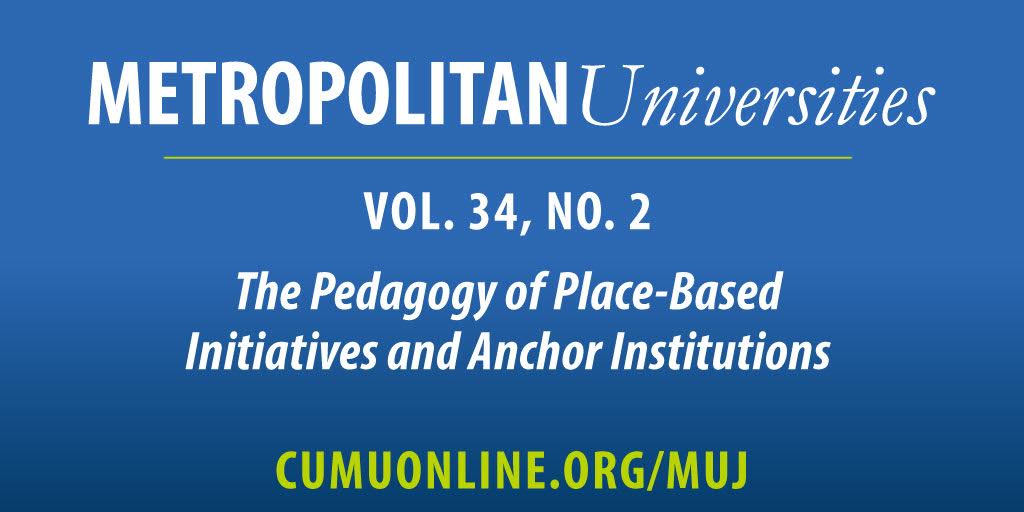Exploring Place-Based Pedagogy as Entrepreneurship Accelerator
DOI:
https://doi.org/10.18060/26459Keywords:
place-based pedagogy, third space, critical pedagogy of place, engaged experiential learning, entrepreneurship, business accelerator, community driven outcomesAbstract
This paper proposes a framework to create a small business and entrepreneurship accelerator designed based on prior work in evolving traditional place-based pedagogy to a more critical pedagogy of place. The proposal is crafted to utilize the built-in resources of a university as the core components in providing necessary resources for success including expert-level technical assistance and a safe, empowering third space for collaboration. The included case is focused on a suburban/urban campus located near several historically underserved geographies. This is important as the proposed small business and entrepreneurship accelerator will have a special focus on educating and guiding local populations – including high school students – in growing their businesses. The proposal in this paper brings together university resources, local community elements, small business owners, social entrepreneurs, and high school students by activating a critical pedagogy of place rooted in improving economic and social issues.
References
America, C. G., & Mallon, P. (2020). "CONNECTEDNESS" IN BUSINESS STUDIES
PEDAGOGY: IS A TRANSITION YEAR ALLURING? Perspectives in Education,
(2), 70-85. https://doi-org.ezproxy.monmouth.edu/10.18820/2519593X/pie.v38.i2.05
Ball, E. L., & Lai, A. (2006). Place-Based Pedagogy for the Arts and Humanities. Pedagogy 6(2), 261-287. https://www.muse.jhu.edu/article/197067
Barajas, H. L., Martin, L. (2016). Shared space, liminal space: Five years into a community-
university place-based experiment. Metropolitan Universities, 27(3), 47-66.
Borén, T., & Schmitt, P. (2022). Knowledge and place-based development - towards networks of
deep learning. European Planning Studies, 30(5), 825-842. https://doi.org/10.1080/09654313.2021.1928042
Bright, D. J. (2020). Place Based Education as a Tool for Rural Career Development. Journal of Counselor Preparation and Supervision, 13(3). http://dx.doi.org/10.7729/42.1393
Butler, S. M., & Diaz, C. (2016). ‘Third places’ as community builders. Brookings. https://www.brookings.edu/blog/up-front/2016/09/14/third-places-as-community-builders/
Ehlenz, M. M. (2018). Defining University Anchor Institution Strategies: Comparing Theory to Practice. Planning Theory & Practice, 19(1), 74-92. https://doi.org/10.1080/14649357.2017.1406980
Fifolt, M., & McCormick, L. C. (2020). Advancing public health education through place-based
learning: “On the road in the deep south”. Pedagogy in Health Promotion, 6(2), 102-112. https://doi.org/10.1177/2373379919839076
Gallay, E., Pykett, A., Smallwood, M., & Flanagan, C. (2020). Urban youth preserving the
environmental commons: Student learning in place-based stewardship education as
citizen scientists. Sustainable Earth, 3(1), 1-10. https://doi.org/10.1186/s42055-020-00026-1
Goldman Sachs Survey Finds Small Businesses Facing Unprecedented Challenges (2022, July 13). Retrieved from https://njbmagazine.com/njb-news-now/goldman-sachs-survey-finds-small-businesses-facing-unprecedented-challenges/
Gruenewald, D. A. (2003). The best of both worlds: A critical pedagogy of place. Educational Researcher, 32(4).
Haarman, S., & Green, P. M. (2021). Considering power in community-based research: Shifting
toward new pedagogical approaches with a 'public work for public things' framework.
Gateways (Sydney, N.S.W.), 14(2), 1-13. https://doi.org/10.5130/ijcre.v14i2.7754
Häggström, M., Schmidt, C., Department of Pedagogical, Curricular and Professional Studies,
Gothenburg University, Faculty of Education. (2020). Enhancing children's literacy and
ecological literacy through critical place-based pedagogy. Environmental Education
Research, 26(12), 1729-1745. https://doi.org/10.1080/13504622.2020.1812537
Heinrich, W. F., & Green, P. M. (2020). Remixing approaches to experiential learning, design, and assessment. The Journal of Experiential Education, 43(2), 205-223. https://doi.org/10.1177/1053825920915608
Iwama, K., Fritz, W. J. (2019). The power of place-based legacies in advancing reengagement
with community. Metropolitan Universities, 30(4), 63-71.
Luter, G. D. (2016). Place-based school reform as method of creating shared urban spaces: What
is it, and what does it mean for universities? Metropolitan Universities, 27(3), 156-177.
McInerney, P., Smyth, J., & Down, B. (2011) Coming to a place near you? The politics and possibilities of a critical pedagogy of place-based education. Asia-Pacific Journal of Teacher Education, 39(1), 3-16. https://doi.org/10.1080/1359866X.2010.540894
New Kabbage Survey Shows 67 Percent of Small Business Owners Expect To Finish 2017 with Higher Revenues (2017, November 20). Retrieved from https://newsroom.kabbage.com/news/company/new-kabbage-survey-shows-67-percent-of-small-business-owners-expect-to-finish-2017-with-higher-revenues/
Saraydarian, G. W. (2021). “Space is the place”: Thinking through a place-based pedagogy for
jazz improvisation. Jazz Education in Research and Practice, 2(1), 154-162.
Sobel, D. (2005). Place-Based Education: Connecting Classrooms and Communities. Great Barrington, MA: Orion Society.
The White House (2021, December 21). Fact sheet: Biden-Harris administration announces reforms to increase equity and level the playing field for underserved small business owners [Press release]. https://www.whitehouse.gov/briefing-room/statements-releases/2021/12/02/fact-sheet-biden-harris-administration-announces-reforms-to-increase-equity-and-level-the-playing-field-for-underserved-small-business-owners/
The White House (2022, January 25). Fact sheet: The new small business boom under the Biden-Harris administration [Press release]. https://www.whitehouse.gov/briefing-room/statements-releases/2022/01/25/fact-sheet-the-new-small-business-boom-under-the-biden-harris-administration/
Towle, A., Leahy, K. (2016). The learning exchange: a shared space for the university of British Columbia and Vancouver’s downtown eastside communities. Metropolitan Universities, 27(3), 67-83.
United States Census Bureau. (2015). 2015 American Community Survey. Retrieved from https://www.census.gov/acs/www/data/data-tables-and-tools/data-profiles/2015/
United States Small Business Administration (2019, April 24). Small businesses drive job growth in united states; they account for 1.8 million net new jobs, latest data show [Press release]. https://advocacy.sba.gov/2019/04/24/small-businesses-drive-job-growth-in-united-states-they-account-for-1-8-million-net-new-jobs-latest-data-show/
Downloads
Published
Issue
Section
License
Copyright (c) 2023 Joe Palazzolo, Raj Devasagayam

This work is licensed under a Creative Commons Attribution 4.0 International License.



